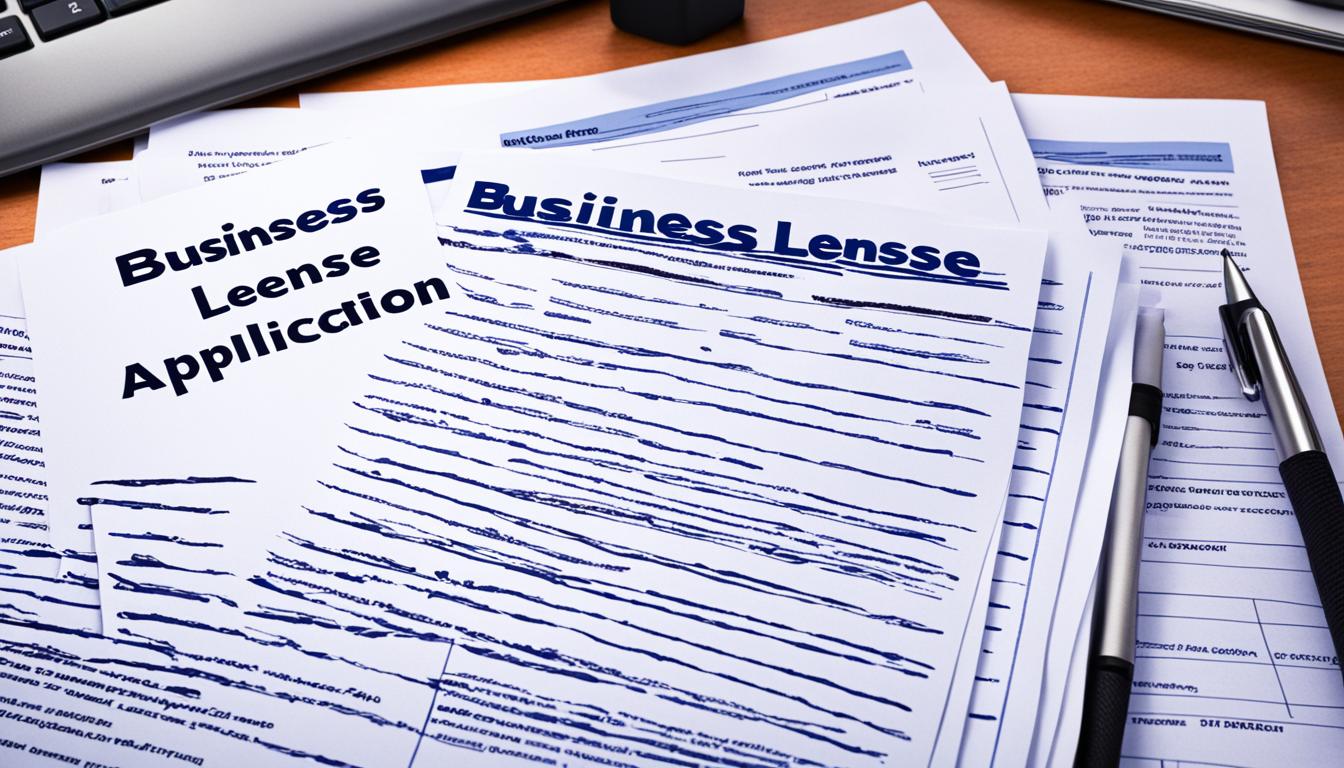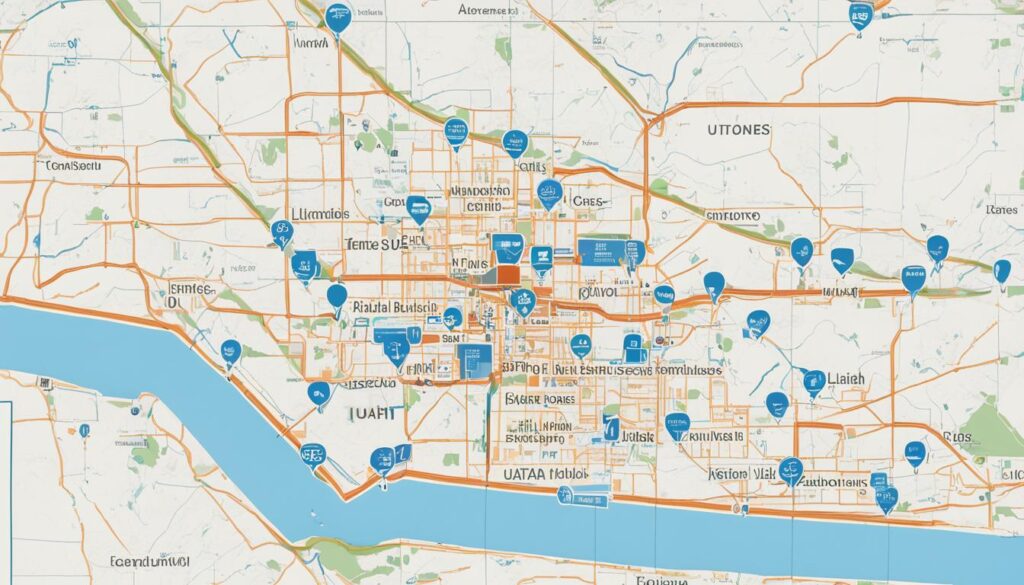Are you a freelance writer wondering if a business license is needed in the US? The need for a business license depends on where you are, what you write, and how your business is structured. Some freelancers may not need any licenses. However, others must get one from their city, state, or professional group to meet freelance writing legal requirements.
Rules for needing a business license vary by location and work type. As a sole proprietor, getting a license is usually a must. Yet, the need for a freelance writing license varies by state or local area. It’s important to look into what’s necessary for your situation. This way, you’ll avoid any legal trouble by following the rules.
If you started freelance writing as a fun side project, you may be unsure if you need a license as you grow. A business license can make you more credible. It allows you to give official receipts and makes getting loans easier. Not having the right license can, however, cause fines and other issues.
Key Takeaways
- Freelance business license needs are influenced by location and work type.
- Sole proprietors typically need a license, but the exact requirements vary.
- It’s critical to research and understand your area’s laws to stay legal.
- Getting a business license can boost your credibility and help with loans.
- Forgetting a necessary license can result in fines and legal troubles.
Understanding Business License Requirements for Freelance Writers
As a freelance writer, figuring out business licenses can be tough. The rules you follow depend on where you live, what you write, and how you run your business. Knowing these rules is key to obeying the law and steering clear of trouble.
Factors That Determine Licensing Needs
Few freelance business licenses fall into one of four categories:
- Local licenses to work in your city, county, or state
- Professional and occupational licenses for specific types of freelance work
- Other permits and licenses, such as sales tax permits or home occupation permits
- Requirements for starting and running a business, including obtaining an independent contractor license for writers and paying self-employment taxes
To find out what licenses you need, check local freelancing rules. Start by looking at your area’s government websites for info on licenses. You might also need to ask writing groups if they suggest any special licenses or certs.
Consequences of Operating Without a Required License
Not having the right licenses can lead to big problems for writers. Working without proper licenses could break local, professional, or federal rules.
If caught, you may face:
- Fines for the period during which you provided services without a license
- Suspension of your ability to offer certain writing services
- Legal and financial issues, particularly related to taxes
To steer clear of these issues, make sure you have all needed licenses before working. Following regulations keeps your business safe and helps it grow strong.
Local Freelance Writing Business Licenses
As a freelance writer, you might need a business license from your city or county. Even if you work from home. This license shows that you’re offering services and follows local rules.
City and County Licensing Requirements
Check if you need a license by looking on your city, municipality, county, and state’s websites. Look for info on “business licenses and permits.” You’ll find what you need and how to apply. Usually, it’s about getting the forms, filling them, and paying a fee. Then, you’ll receive a confirmation that you can do your writing business.
Zoning Regulations for Home-Based Freelance Writers
Make sure zoning laws allow a home business before you get a license. If you rent, see if your landlord is okay with it. Check if your Home Owner’s Association or community rules permit it if you own your place. This step is vital to avoid problems later.
Renewing Local Business Licenses
How you renew your freelance writing business license depends on the type you have. Usually, you need to renew it every year. You’ll get a reminder from your local office. Staying current on renewals keeps your business smooth and legal.
Professional and Occupational Licenses for Freelance Writers
You might ask yourself, “Do freelance writers need a business license?” The answer varies depending on what you do. If your freelancing work is in a regulated area, you likely need a license.
Freelance jobs that usually need a license include:
- Healthcare or medical writing
- Giving financial or investment advice
- Being a project manager
- Handling accounting or bookkeeping
- Counseling, therapy, or social work
- Legal advice and services
- Architecture or engineering
- Real estate sales
If you work in one of these areas as a freelancer, you need a license. You must also register with the relevant professional group and get insurance against malpractice claims.
In Washington state, specific professionals must get a license. This includes those in medicine, law, accounting, building, hairdressing, real estate, and investigating, to name a few.
Not having the right license can lead to fines, being told to stop working, or facing legal charges.
The way you renew your license depends on what you do and where you work. You’ll usually get a reminder letter before your current license expires. This helps you stay up to date with your field’s rules.
Additional Permits and Licenses for Freelance Writing Businesses
Are you a freelance writer thinking about extra permits or licenses? The Small Business Administration’s website mentions various licenses for businesses in the US. Many of these aren’t needed for freelance work. But, it’s wise to look over the list to check for any that might be relevant to you.

If you need a business license, it’s not very expensive. It usually costs between $34 and $100, depending on where you are. This cost can be a one-time payment or an annual fee. It varies by city and state.
Sales Tax Permits
Freelancers selling physical items might need a sales tax permit. This applies if you’re selling products like books or merch. You might need to collect and pay sales tax to your government. Rules differ from place to place, so always check local requirements.
For details on licenses and permits in Alabama, visit this Forbes article. Though it covers Alabama, it offers insights for freelance writers nationwide.
Home Occupation Permits
Working from home might need a special permit. This permit shows that your business at home follows local zoning and laws. For example:
- You may need to keep business traffic and noise low.
- Using external signs or indicators for your business might be limited.
- It should not disturb your neighbors.
Each place can have different rules for home businesses. Be sure to research what’s needed in your area. Check with local authorities for the details.
Business Structure and Licensing Requirements for Freelance Writers
The type of business entity for your freelance work impacts if you need a business license. Factors like where you are and future plans matter. We’ll look into what different business types need for licensing.
Sole Proprietorships and Partnerships
A solo freelance writer might choose a sole proprietorship. Usually, you won’t need an extra business license. But, getting one could make your services seem more credible to clients. With a sole proprietorship, you’re personally responsible for any business problems.
If your freelance business uses a name that’s not yours, you’ll need a “Doing Business As” (DBA) form. You also need to carefully handle taxes. When working with partners, it’s smart to have an agreement that outlines each person’s duties. For hiring employees, you must get an Employer Identification Number from the IRS.
LLCs and Corporations
Choosing a Limited Liability Company (LLC) offers some protections but keeps things simpler than a corporation. It helps protect your personal assets in certain legal situations. And, you pay taxes based on your personal return. An LLC, however, might not cover you completely in all cases.
Setting up an LLC requires more steps and could mean more taxes than a sole proprietorship. But, they can be great if you have a small team. For an LLC or corporation, make sure to follow these steps:
- Create a unique business name and check if it’s already taken in your state
- Register your business by filing Articles of Organization (for LLCs) or Articles of Incorporation (for corporations) with your state and pay the fee
- Decide on a Registered Agent (which can be you)
- Submit an annual or periodic report with your Secretary of State or business formation agency and pay the fee
- Get an Employer Identification Number from the IRS
- Use a separate business account for all your freelancing activities
The need for a business license varies by structure and area. Knowing the requirements for different business forms can help you decide wisely. This ensures your freelance writing business is protected and meets your goals.
do freelance writers need a business license
You might wonder if you need a business license to freelance write. The need for a license depends on where you live and work. It also changes with the type of work you do.
It’s vital to look into the laws and rules where you are. With the right research, you can follow the regulations and benefit from having a license.

Researching Specific Licensing Requirements
Finding out if you need a license involves a few steps. You can check for yourself by looking at local and state government websites. They often have clear info on what you need.
Another option is to use a business license research service. They provide a detailed report for a fee. Or, if you prefer a personal touch, hiring a business attorney is another way to go. They can look into the requirements for you and help with the paperwork. But this can cost more.
Costs Associated with Obtaining a Business License
The cost of a business license varies. It can be between $34 to $100, depending on where you are and the type of license. Some fees are one-time only. Others have to be paid every year.
It’s crucial to include these costs in your budget. And to remember the renewal dates. This prevents any issues and helps keep your business running smoothly.
Benefits of Having a Business License as a Freelance Writer
There are many benefits to having a business license. For one, it shows clients that you’re serious. They can trust you more. Plus, a license makes you look more professional.
A license can also help you get more business. It proves you run a legal operation. People are often more willing to hire someone who follows the rules.
Having a license can assist in other areas too. You can use it as proof of income for loans or credit cards. This makes financial matters easier to handle. And it reminds you to be diligent about your taxes, which is crucial for avoiding issues down the line.
Remember, paying your taxes is not just a good idea – it’s the law.
Alternatives to Traditional Business Licenses for Freelance Writers
Are you a freelance writer looking for options other than a standard business license? Most freelancers find it beneficial to get a business license. However, in some cases, you can operate under a “Doing Business As” (DBA) name instead.
Operating Under a “Doing Business As” (DBA) Name
A DBA name lets you do business using a name different from your legal one. It’s handy for freelance writers interested in building a brand. They can do so without the hassle of creating a separate legal entity.
- If you’re using your own name for your freelance business, a DBA won’t be necessary. You can continue as a sole proprietor with your personal name.
- Yet, using a business name like “ABC Writing Services” means you should get a DBA. This step allows you to legally use that name on business papers.
- Getting a DBA is usually straightforward. You file the required paperwork with your local city or county clerk and pay a small fee. Make sure to learn about your area’s specific rules and costs.
Choosing a DBA gives some flexibility to freelance writers. But remember, a DBA doesn’t offer as much legal protection as an LLC or corporation. If you’re worried about personal liability, or plan to grow your business big, keep this in mind.
Deciding on a DBA or a business license is important. Either way, make sure to follow all the local laws. Research your choices and choose what’s best for your writing business. This way, you’ll create a strong start and avoid unnecessary legal problems.
Staying Compliant with Freelance Writing Business Regulations
Do you ask yourself: do freelance writers need a business license? Getting a license and paying taxes might look like more work. Yet, it helps you in the long run. Having a business license means your earnings are safe and legal.
A business license reminds you to pay taxes on time. This keeps you from facing extra charges. The IRS says all business owners, like freelance writers, must pay taxes. Breaking this rule, anywhere in the U.S., has severe consequences.
Paying taxes shows you’re serious about your freelance work. It proves you are a professional. This could bring you better clients and a great name in your field. So, putting in that initial effort to get your business license as a freelance writer is wise. It assures your business’s success and that you’re doing things by the book.




